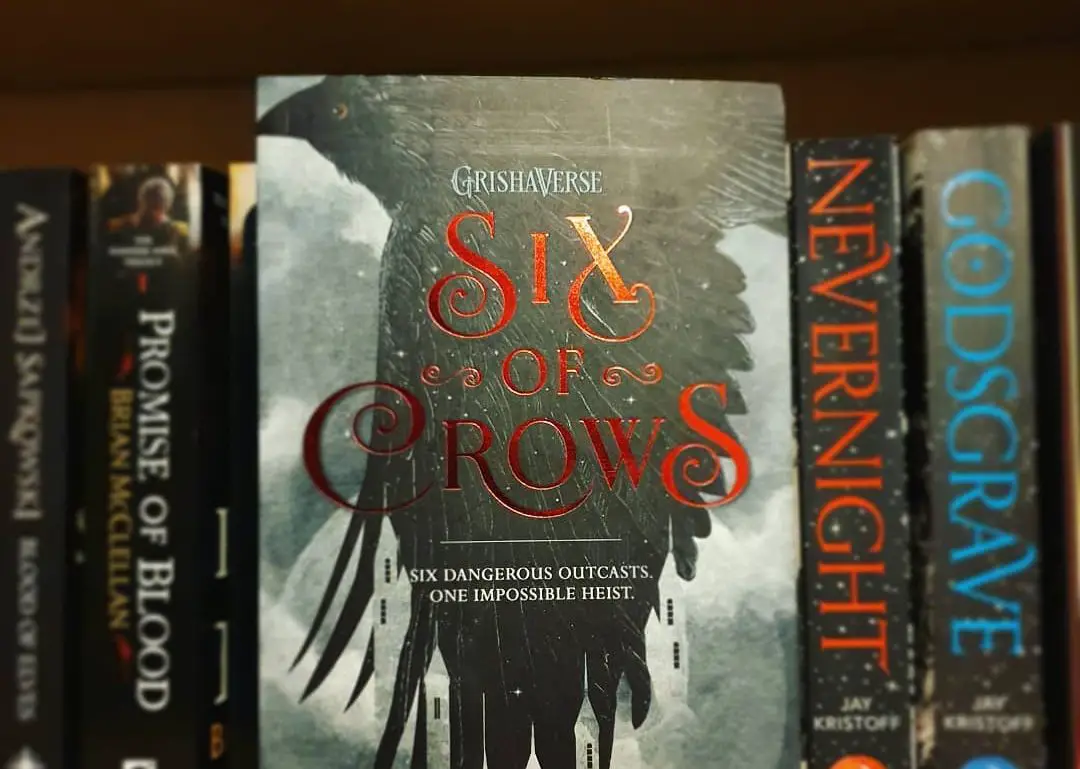There is a world out there of explicable magic. Where shadows dance interwoven, forging the harrowing bodies of soulless vultures predestined to hunt a pulsing heartbeat. Where the forces of light and dark battle one another to revert the world back into a subjective solace. Welcome to the Grishaverse.
Where a ragtag band of six outcasts set aside their prejudice to pull off a heist at the most heavily guarded prison. A world of dark-haired queens, mangled friends who risk everything, orphans turned saints and the scarred king, who is charismatic enough to feign the sanity that masks the ripening blackness infiltrating his once pure spirit. A world ruled by the all-powerful and regal Grisha.
Anyone well acquainted with young adult (YA) fantasy novels, likely perks up at the mention of Leigh Bardugo’s “Grishaverse.” Minds immediately wander to the magical Ravka, a nation heavily inspired by czarist Russia through its Slavic-influenced character names, East Asian architecture and religious figures.
However, avid Grishaverse fans might be unaware of the forthcoming Netflix series “Shadow and Bone” to be adapted by Eric Heisserer (screenwriter of “Bird Box” and “Arrival”) and produced by Bardugo herself.
This is real. Shadow & Bone AND Six of Crows are coming to @netflix. The #grishaverse is about to come to life. https://t.co/FPD2VbYf2F
— Leigh Bardugo (away for a while) (@LBardugo) January 10, 2019
Despite the misleading title of the Netflix show, “Shadow and Bone” will not be exclusive to The Grisha Trilogy (of which the first installment is called “Shadow and Bone”), but instead be merged with the “Six of Crows” duology, featuring the fan favorite Dregs.
Understandably, the series harbors sentimental significance to many, explaining its quick rise to literary popularity. Thus far, Bardugo has been tight-lipped about divulging information about the show’s progress, leaving fans to nervously speculate whether the small-screen adaptation will do the books justice.
Though both concern and excitement circulate amongst the Grishaverse fandom, premature production news gives both familiar readers and curious viewers hope for a fantasy series that caters to everyone, regardless of their familiarity with the series.
A World of Diversity
It is no secret that both fantasy novels and adaptations lack in diversity. The Grishaverse is no exception. Nevertheless, as Bardugo has grown a writing platform and built a communicative relationship with her readership, she has been gracious in her reception of fan’s concerns.
Accordingly, there was an evident dedication to increased diversity between her 2012 “Shadow and Bone” trilogy and her 2015 “Six of Crows” duology, which feature characters of distinct cultures, body types, disabilities and sexual orientations.
https://www.instagram.com/p/Bzvl5WaFDAX/?utm_source=ig_web_copy_link
To remedy the lack of representation in the original Grisha trilogy, Heisserer and Bardugo publicly announced their decision to change the cultural backgrounds of several characters previously assumed to be white, based on their physical descriptors in the novels.
Alina Starkova, the protagonist of “Shadow and Bone,” will now be of “Shu” origin (a nation inspired by Chinese and Mongolian culture). The open casting call for Alina sought an actress who was half-Asian. Producers assured interested candidates that the alternative race had no requisite, instead prioritizing the actress’s talent to secure the role.
Whether one is a devout fan of the series, or simply a casual Netflix viewer venturing for a fantasy adaptation with more relatable characterization, “Shadow and Bone” will set itself apart from other Netflix fantasy competitors that discount the need for diversity.
A World of Relatable Characters
Unlike most of its fantasy counterparts, which emphasize plot-driven stories, the Grishaverse touts a more character-driven narrative. Book reviewers on the web praise the elaborate nature of its beloved characters, confirming the intrinsic value of characterization to bibliophiles.
Reimagining the coming-of-age trope, the Grisha trilogy features a protagonist who learns self-awareness through her paramount decisions. Alina is frail, both mentally and physically, for the greater part of the first novel.
She constantly questions the viability of her own ethics, always seeking out the “right” thing to do. Her journey of self-discovery and inner turmoil is not unlike that of every millennial.
Alina becomes strong in her own way. The inclusion of her fragility and humanity acts as a scaffold for readers, who can imagine themselves in Alina’s place, inspiring the notion of a personalized strength not unlike the divine Grisha.
A World Where Magic Makes Sense
Fantasy novels are riddled with magic that, frankly, makes little sense. Some of the most popular fantasy books boast a magic system in which witches and warlocks gain abilities as a birthright. The magic in these cherished novels never seem to have an explanation for abilities, limits or origin.
In “Shadow and Bone,” the Grishaverse establishes that the magic system throughout Ravka does not just simply exist. The premise of the Grisha’s magic is fabricated through science.
The Grishaverse has a three-tiered magic system to which a Grisha can be classified: Corporalki (The Order of the Living and the Dead), Etherealki (The Order of Summoners) and Materialki (The Order of Fabrikators).
So, an Etherealki, who summons wind, does not simply do so by inexplicably being able to create wind. Realistically, they alter the pressure of their surroundings to induce a wind-like motion. Furthermore, a Materialki, who alters metal alloys, presumably changes the particulate nature of materials to their desire.
By explaining the technicalities behind the Grisha’s ability to manipulate elements, Bardugo fills in the hole that other fantasy authors dig within their storylines that leave readers perplexed by magic’s functionality.
For those familiar with fantasy plots, the Grishaverse is a refreshing take on a contemporary magic system by explaining the science behind metaphysical abilities. In a world resolved by facts, readers can feel more connected to the stories they love through palpable creations providing compelling details for imagined immersion.
Readers indulge in fantasy novels as a form of escapism. Existing through the lives of others is either a convenient way to disconnect from personal hardship or an apparatus to feel understood through similarly experienced circumstances. A tangible and interactive outlet, the Grishaverse grants fantasy-lovers the chance to exist in an alternate reality.
Through the highly anticipated screen adaptation, fans can continue to garner that vital catharsis while wrapped in a blanket, eating popcorn, living vicariously through characters far from ordinary.
















